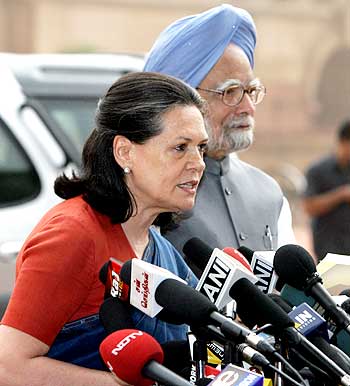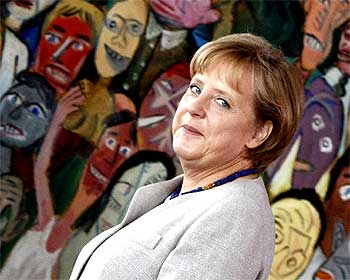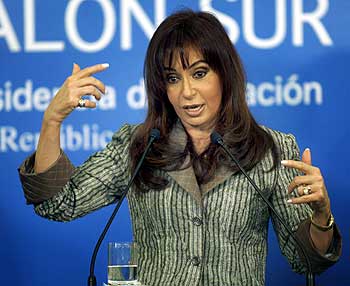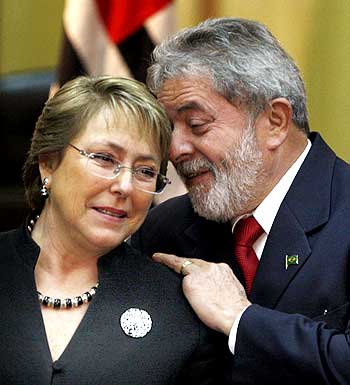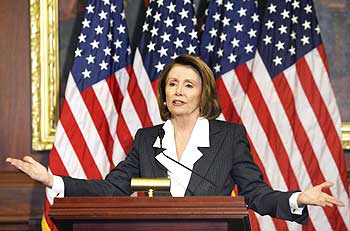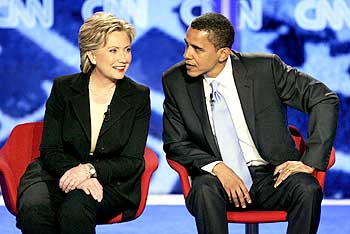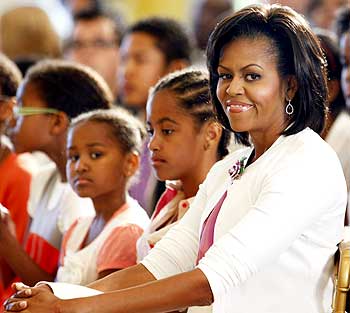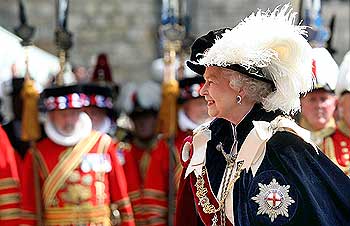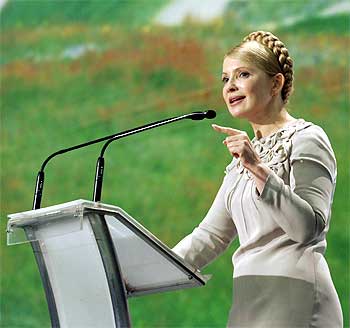 | « Back to article | Print this article |
Meet the most powerful women politicians
Congress President Sonia Gandhi has been ranked among top 50 of the World's 100 Most Powerful Women list compiled by Forbes. Gandhi improved her ranking from 21 last year to 13 this year.
The landslide victory in the recent general election further strengthened her position as the leader of "India's most powerful political party" -- Indian National Congress.
The rankings are a combination of two scores: visibility -- by press mentions -- and the size of the organization or country these women lead.
Uttar Pradesh Chief Minister Mayawati, who was ranked 59th in last year's list, did not figure in the latest list put up on Forbes.com. Click on the NEXT button below to read further...The world's most powerful women politicians
For the fourth consecutive year, German Chancellor Angela Merkel tops the Forbes list.
According to Forbes, up for re-election this September, Merkel -- leader of the world's fourth-largest economy -- faces a tough year: Germany's GDP is expected to shrink this year despite a small uptick in the second quarter.
As a female politician from a centre right party, and a scientist, many in foreign press have compared Merkel to former British Prime Minister Margaret Thatcher. Some have referred to her as "Iron Lady", "Iron Girl" and even "The Iron Frau".
She was the first female German chancellor and the youngest German chancellor since the Second World War
The world's most powerful women politicians
Argentine President Cristina Fernandez is ranked 11 in the list.
A member of the Justicialist Party, she was a Senator for Buenos Aires province prior to taking office. She is the wife of former Argentine President Nestor Kirchner, and acted as First Lady during his term. In the October 2007 general election, Fernandez successfully ran for the presidency of Argentina, representing the ruling Front for Victory party.
She suffered a setback in recent mid-term elections that cost the ruling Peronist Party control of both houses of Congress.
According to Forbes, a cabinet reorganization in July may not be enough to fix the country's socioeconomic instability, which many blame on the government's nationalization of AFJP private pensions as well as the conflict with farmers over grain taxes.
The world's most powerful women politicians
Christine Lagarde, the first female finance minister of a G-8 economy, is ranked 17th on your list.
In 2008, Forbes ranked Lagarde the 14th most powerful woman in the world.
A noted antitrust and labour lawyer, Lagarde made history as the first female chairman of the international law firm Baker & McKenzie. She has been awarded France's highest honor, the Legion d'honneur.
She was previously Minister of Agriculture and Fishing and Minister of Trade in the government of Dominique de Villepin.
The world's most powerful women politicians
Chile's first female president Michelle Bachelet is ranked 22nd in the list. In 2008, she was ranked 25th in the list.
A centre-left politician, she won the 2006 presidential election in a runoff, beating center-right billionaire businessman and former senator Sebastian Pinera.
Bachelet's cabinet of ministers comprised an equal number of men and women, as was promised during her campaign.
The world's most powerful women politicians
Nancy Pelosi, Speaker of the United States House of Representatives, is ranked 35th in the list.
Pelosi is the first female Speaker of the House of Representatives.
As Speaker of the House, Pelosi is second in the line of presidential succession, following Vice President Joe Biden, which makes her the highest-ranking female politician in United States history.
The world's most powerful women politicians
United States Secretary of State Hillary Rodham Clinton is ranked 36th in the Forbes list.
Clinton spent her initial days as Secretary of State telephoning dozens of world leaders and indicating that US foreign policy would change direction: "We have a lot of damage to repair."
In February 2009, Clinton made her first trip as secretary to Asia, visiting Japan, Indonesia, South Korea, and China on what she described as a 'listening tour' that was 'intended to really find a path forward'. She continued to travel heavily in her first months in office, often getting very enthusiastic responses by engaging with the local populace
Her first 100 days found her travelling over 70,000 miles (110,000 km), having no trouble adapting to being a team player subordinate to Obama, and gaining skills as an executive.
The world's most powerful women politicians
United States First lady Michelle Obama, a champion for working women and the families of the US military, appears at Number 40.
With the ascent of her husband as a prominent national politician, Michelle Obama, like all other first ladies, has become a part of popular culture. In May 2006, Essence magazine listed her among '25 of the World's Most Inspiring Women'.
In July 2007, Vanity Fair magazine listed her among '10 of the World's Best Dressed People'.
Recently, she has been trying to divert the media's attention from her fashion tastes to her charitable image. She has stated that she would like to focus attention as First Lady on issues of concern to military families and working families.
The world's most powerful women politicians
Britain's Queen Elizabeth II is ranked 42 on the Forbes list
The British monarch is one of the world's most powerful and respected heads of state, though she exercises very little executive power.
According to Forbes, during her 57-year reign, she counselled 12 British prime ministers -- from Winston Churchill to today's Gordon Brown -- who have all taken her advice seriously, and she has seen her country through numerous crises with a sense of quiet fortitude and discipline.
The Queen's personal fortune has been the subject of speculation for many years. Forbes estimated her net worth at around $600 million (330 million pounds), but official Buckingham Palace statements called estimates of 100 million pounds 'grossly overstated'.
The world's most powerful women politicians
Yulia Tymoshenko, Ukraine's first female prime minister, is ranked 47 in the Forbes list.
Before becoming Ukraine's PM, Tymoshenko was one of the key leaders of the Orange Revolution (A series of protests and political events that took place in Ukraine from late November 2004 to January 2005, in the immediate aftermath of the run-off vote of the 2004 Ukrainian presidential election, which was claimed to be marred by massive corruption, voter intimidation and direct electoral fraud).
Prior to her political career, Tymoshenko was a successful but controversial businesswoman in the gas industry, which made her wealthy.
Tymoshenko first became prime minister in 2005 between January 24 and September 8. She was elected to the post again on December 18, 2007.
It is believed that she is a candidate in the presidential elections in 2010.
